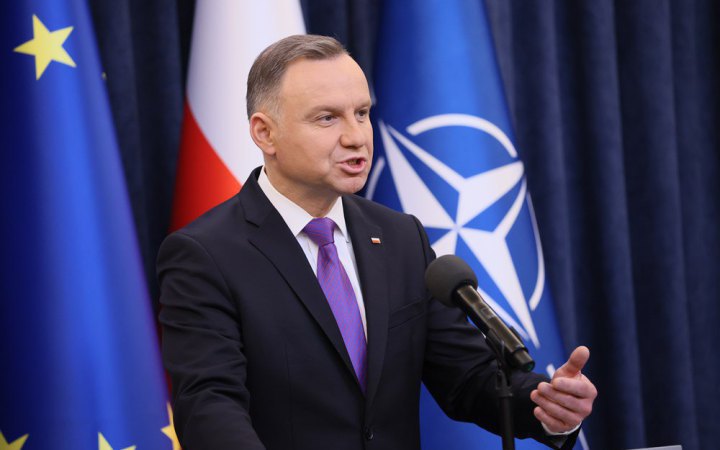President of Poland Andrzej Duda gave details of the special summit of Ukraine's allies held in Paris on 26 February.
According to RMF24, the event focused on strengthening cooperation in support of Kyiv. Polish president also added that the allies discussed the supply of ammunition.
"I hope that in the near future, together we will be able to prepare significant supplies of ammunition for Ukraine, because this is the most important thing... This is what Ukraine needs the most, this is what President of Ukraine Volodymyr Zelenskyy has been saying many times recently. This is a very particular response not only from European leaders, because there were also representatives of Canada and the United States," Duda said.
Other forms of support for Ukraine were also discussed. In particular, they discussed assistance in mine clearance, as well as training to support border security, for example, the border with Belarus, where - as Duda stressed - "of course there is no war, but which, from Ukraine's point of view, is a significant threat and also requires active action by Ukrainian forces".
The Polish president noted that the allies have very different demining capabilities. This includes private police forces, which also have sappers and can provide support to Ukraine.
The allies discussed industrial cooperation with Kyiv, for example, in the missile industry. Duda said that "Ukraine has its own missile production, but it is possible to transfer and make available modern technologies that are available in Western countries."
"First of all, NATO countries, which today could modernise Ukrainian production and make Ukraine capable of producing much more modern missiles for its own defence," Duda explained.
The Polish president stressed that the issue of sending troops to Ukraine was discussed and that "the most heated debate" had broken out around it. Duda said that "there was absolutely no agreement" and "there are absolutely no such decisions".
The summit was attended by Presidents Sauli Niinistö of Finland, Klaus Iohannis of Romania, Gitanas Nausėda of Lithuania, Chancellors Olaf Scholz of Germany and Karl Nehammer of Austria, Prime Ministers Robert Fico of Slovakia, Mark Rutte of the Netherlands, Kaja Kallas of Estonia, Petr Fiala of the Czech Republic, Pedro Sanchez of Spain and David Cameron, the UK Foreign Secretary.
The United States was represented by Under Secretary of State for European and Eurasian Affairs James O'Brien, and Canada by Defence Minister William Blair.
According to Euractiv, the leaders endorsed five "categories of action" that need to be worked on urgently:
- cyber defence
- joint production of weapons and ammunition in Ukraine
- defence of countries facing a direct threat from Russia, especially Moldova
- support for Ukraine on the Belarusian border through the use of non-military forces
- demining operations.
A new coalition will also emerge on medium- and long-range missiles and bombs.








